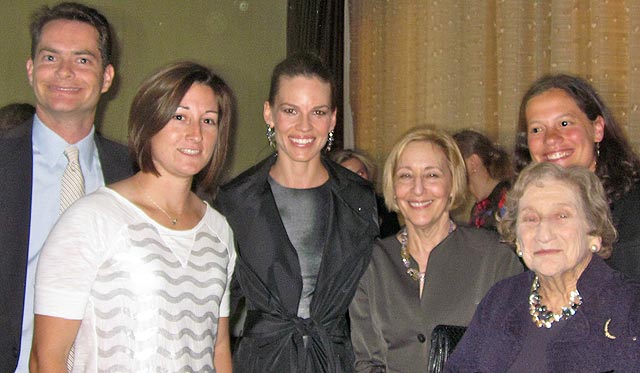
Ty Alper, Jen Moreno, Hilary Swank, Elisabeth Semel, Rita Semel, and Kate Weisburd
By Andrew Cohen
Berkeley Law’s Death Penalty Clinic has received the 2011 Abolition Award from Death Penalty Focus (DPF), a large nonprofit dedicated to eradicating capital punishment. Clinic Director Elisabeth Semel, joined by Associate Director Ty Alper, staff, and clinic alumni Erica Zunkel ’02 and Nisha Shah ’05, accepted the honor May 12 at DPF’s annual awards dinner in Beverly Hills.
The clinic, which opened in 2001, supervises up to 18 Berkeley Law students each semester. Those students work on the clinic’s cases—assisting in the representation of death row inmates and tackling systemic inequities that affect capital and non-capital defendants.
The clinic played a key role in two successful U.S. Supreme Court cases involving the right to a jury selected free of race discrimination. It also helped secure the release of a man who served more than eight years in prison after his conviction on capital murder charges, and helped secure dismissal of the death charge in one case and life sentences in two others.
The clinic currently represents clients in post-conviction capital proceedings in Alabama and California through its Southern Capital Assistance Project, led by staff attorney Kate Weisburd. But the students have also provided investigation and litigation support to understaffed and underfunded capital trial attorneys in cases in Alabama, Georgia and Virginia.
After accepting the award, Semel told the audience the clinic is “transformative for our students, who they are, how they fit in the struggle for social justice, and what responsibility they have as members of the legal profession.” She said their experience provides “a tangible sense of the difference they can make in the lives of clients who need, but are often denied, vigorous representation.”
Semel also thanked the clinic’s founding donors Nick McKweon and Peter Davies for their vision, saying it was to “engage law students in defending men and women, not solely because we suspect they might be innocent, but because the state wants to put them to death and they need a lawyer.”
The award was presented by Gloria Killian, a former law student released from prison in 2002—after serving 17½ years on a sentence of 32 years to life—for allegedly being the mastermind behind a 1981 robbery and murder in Sacramento. The U.S. Ninth Circuit Court of Appeals overturned her conviction, ruling it was based solely on perjured testimony.
Killian praised the Death Penalty Clinic for responding to “the critical shortage of qualified lawyers for persons facing capital punishment,” and for providing “exemplary leadership and unprecedented commitment to fostering human rights and advancing public awareness about the fundamental injustice of the death penalty.”
In 2007, the clinic launched its Lethal Injection Project, in which Alper plays a major role. Staff attorneys Megan McCracken and Jen Moreno and students consult with lawyers, policymakers, and journalists, and participate in challenges to lethal injection methods through litigation and administrative proceedings. The project’s web-based clearinghouse, www.lethalinjection.org, has become a key resource for lawyers, the media, and the public.
Of the many clinic alumni involved in criminal justice work, several conduct full-time defenses of death-sentenced clients, and more than a dozen are employed by public defender offices and public-interest nonprofits. Others, who work for large law firms, helped convince their firms to take capital cases on a pro bono basis, and have joined legal teams to work on such cases.
The annual DPF event, which draws numerous celebrities, also recognized Illinois Governor Pat Quinn, two-time Oscar winner Hilary Swank for her performance in “Conviction,” Southern Center for Human Rights President and Senior Counsel Stephen Bright, DPF Executive Director Lance Lindsey, television director/producer Tommy Schlamme, and The Sisters of St. Joseph of Orange, California.